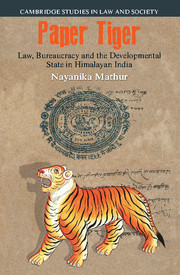Legal historians of South Asia keep a close eye on work in legal anthropology, and those working on paper and bureaucracy are no exception. A hub of historians is working on documents and their materiality in South Asian legal history, inspired most recently by Bhavani Raman's Document Raj (2012). We also have Matthew Hull's Government of Paper: The Materiality of Bureaucracy in Urban Pakistan (2012). Wonderful photographic collections like this help set the mood.
For those working on seas of paper, a new book out in the Cambridge Studies in Law and Society series will be of interest. Here is the description of Nayanika Mathur's Paper Tiger: Law, Bureaucracy and the Developmental State in Himalayan India, from the press:
 A big cat overthrows the Indian state and establishes a reign of terror over the residents of a Himalayan town. A welfare legislation aimed at providing employment and commanding a huge budget becomes 'unimplementable' in a region bedeviled by high levels of poverty and unemployment. Paper Tiger provides a lively ethnographic account of how such seemingly bizarre scenarios come to be in contemporary India. Based on eighteen months of intensive fieldwork, this book presents a unique explanation for why and how progressive laws can do what they do and not, ever-so-often, what they are supposed to do. It reveals the double-edged effects of the reforms that have been ushered in by the post-liberalization Indian state, particularly the effort to render itself more transparent and accountable. Through a meticulous detailing of everyday bureaucratic life on the Himalayan borderland, Paper Tiger makes an argument for shifting the very frames of thought through which we apprehend the workings of the developmental Indian state.
A big cat overthrows the Indian state and establishes a reign of terror over the residents of a Himalayan town. A welfare legislation aimed at providing employment and commanding a huge budget becomes 'unimplementable' in a region bedeviled by high levels of poverty and unemployment. Paper Tiger provides a lively ethnographic account of how such seemingly bizarre scenarios come to be in contemporary India. Based on eighteen months of intensive fieldwork, this book presents a unique explanation for why and how progressive laws can do what they do and not, ever-so-often, what they are supposed to do. It reveals the double-edged effects of the reforms that have been ushered in by the post-liberalization Indian state, particularly the effort to render itself more transparent and accountable. Through a meticulous detailing of everyday bureaucratic life on the Himalayan borderland, Paper Tiger makes an argument for shifting the very frames of thought through which we apprehend the workings of the developmental Indian state.
A few blurbs:
For those working on seas of paper, a new book out in the Cambridge Studies in Law and Society series will be of interest. Here is the description of Nayanika Mathur's Paper Tiger: Law, Bureaucracy and the Developmental State in Himalayan India, from the press:
 A big cat overthrows the Indian state and establishes a reign of terror over the residents of a Himalayan town. A welfare legislation aimed at providing employment and commanding a huge budget becomes 'unimplementable' in a region bedeviled by high levels of poverty and unemployment. Paper Tiger provides a lively ethnographic account of how such seemingly bizarre scenarios come to be in contemporary India. Based on eighteen months of intensive fieldwork, this book presents a unique explanation for why and how progressive laws can do what they do and not, ever-so-often, what they are supposed to do. It reveals the double-edged effects of the reforms that have been ushered in by the post-liberalization Indian state, particularly the effort to render itself more transparent and accountable. Through a meticulous detailing of everyday bureaucratic life on the Himalayan borderland, Paper Tiger makes an argument for shifting the very frames of thought through which we apprehend the workings of the developmental Indian state.
A big cat overthrows the Indian state and establishes a reign of terror over the residents of a Himalayan town. A welfare legislation aimed at providing employment and commanding a huge budget becomes 'unimplementable' in a region bedeviled by high levels of poverty and unemployment. Paper Tiger provides a lively ethnographic account of how such seemingly bizarre scenarios come to be in contemporary India. Based on eighteen months of intensive fieldwork, this book presents a unique explanation for why and how progressive laws can do what they do and not, ever-so-often, what they are supposed to do. It reveals the double-edged effects of the reforms that have been ushered in by the post-liberalization Indian state, particularly the effort to render itself more transparent and accountable. Through a meticulous detailing of everyday bureaucratic life on the Himalayan borderland, Paper Tiger makes an argument for shifting the very frames of thought through which we apprehend the workings of the developmental Indian state.A few blurbs:
"This outstanding ethnography offers a rich glimpse of the workings of the state in a remote area of India. It shows that the problem of the implementation of law in India is less a problem of corruption or of neo-liberal governmentality and more a problem of the way in which the social life of paper produces a strange combination of affect and effect at the local level. Bureaucratic rule is created through the materiality of documents, letters and written texts which implement the state rather than the law, a paradox which explains both the omnipresence of the state and its limited effects on policy. This book will be of great interest to all students of the state, law and bureaucracy." -Arjun Appadurai, New York University